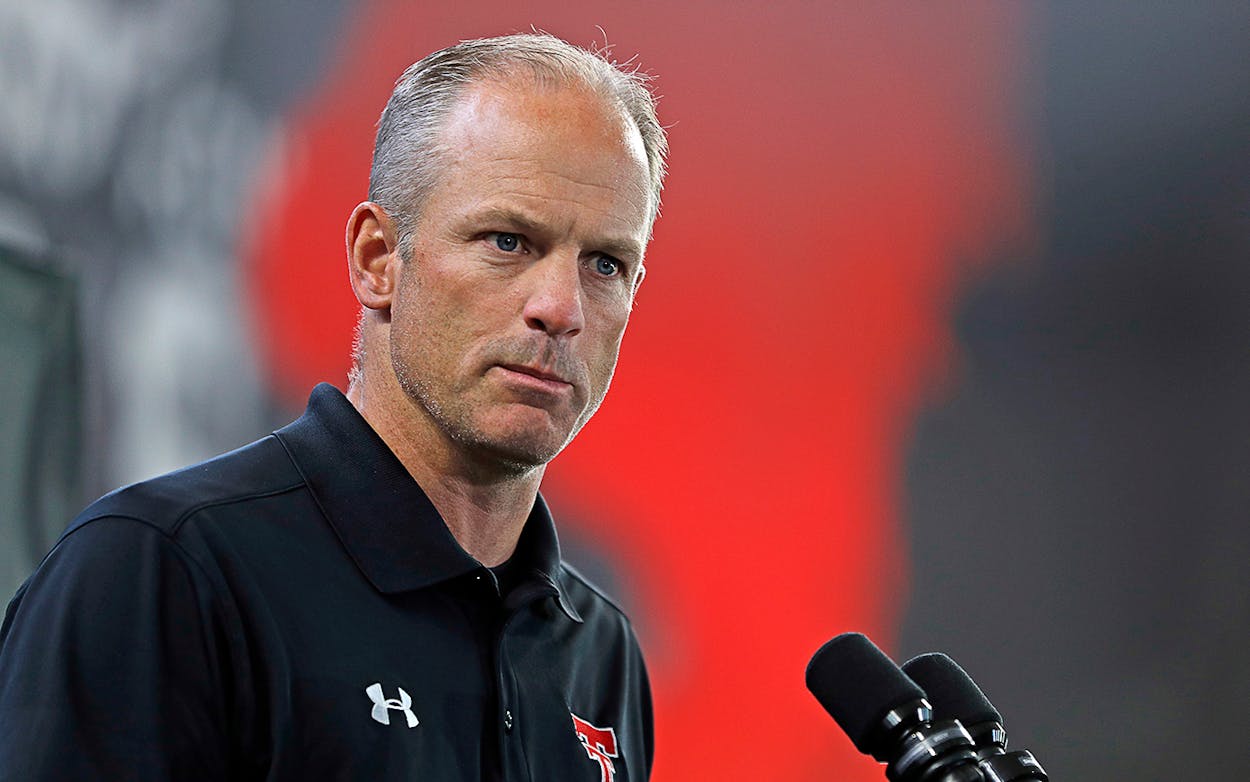In January 2016, Texas Tech head coach Matt Wells—who was then in the same role at Utah State University—met with Torrey Green, a wide receiver who had played for him the previous three seasons, to discuss sexual assault allegations against the player. The school’s associate vice president for student affairs, Eric Olsen, also attended, according to a lawsuit reported on by the Deseret News and the Daily Beast. The university took no action against Green after the meeting, but a few months later, he was arrested on multiple accounts of sexual assault.
The timing of when Wells and the USU football program knew what is unclear, but—as we’ve learned from Baylor, Florida State, UNC, the University of Richmond, and the University of Tennessee—football coaches and athletics departments tend to hear early on when their athletes face allegations. The first of Green’s victims—Green was ultimately convicted of raping six women—had gone to the university’s Title IX department in 2014, with at least three other students reporting their experiences to the school and to police the following year.
By the time Wells and Olsen met with Green, the star had completed his college career and already played his last down of USU football.
Wells moved on to Texas Tech in November 2018. After the News reported last week on the lawsuit—which names USU (but not the coach) as the defendant—Wells offered an explanation for why he didn’t take action against Green. Because the university has a Title IX department that shoulders that responsibility, he claimed, it would have been inappropriate for him to take action against his player. According to the Texas Tribune:
“While I followed all Utah State procedures, I am deeply saddened for the hurt suffered by these women,” Wells said in a statement Friday. […]
Wells said in his statement that Green “had already finished his senior [football] season in 2015” before he attended the meeting with Green.
“I am well aware that I have a responsibility to report any possible Title IX issues,” Wells said, referring to the federal gender-equity law. “It is the Title IX Office’s responsibility to investigate an allegation, so it would have been completely wrong for me to have done so.”
That’s the sort of thing that sounds reasonable on the surface—it is the Title IX office’s responsibility to investigate allegations of sexual assault—but that doesn’t hold up under much scrutiny. Football coaches have a great deal of discretion when it comes to what behaviors they decide to hold athletes accountable for. You can lose your scholarship for oversleeping, face a suspension and an official reprimand for spitting, miss a bowl game for blowing curfew, get suspended for the “completely unacceptable” sin of chatting with the opposing team’s cheerleaders, or get held out of a game for missing an unnamed team function that was almost certainly a trip to a local seniors’ center. Wells—like any other football coach—certainly has the discretionary authority to tell a player facing sexual assault allegations that he’s not going to suit up until a full investigation has been completed. In March, after arriving at Texas Tech, Wells suspended four players without even giving a reason.
Football coaches routinely struggle to navigate their own authority when issues of sexual and domestic violence comes up. Coaches talk about “zero tolerance” policies that they find wiggle room in. They describe their own untrue public statements about their knowledge of allegations as “misstatements.” They tell victims who come to them about their players to go to the police, while allowing the players to continue to work out with the team. They sit on allegations indefinitely. When Wells says that it would be “completely wrong” to get involved in an allegation, he’s just saying out loud what the actions of a lot of coaches have already told us: in college football, coaches who talk about holding players accountable are generally referring to in-game mistakes and minor rule violations, not more serious allegations.
At a glance, that might be understandable. These are serious issues that are outside a football coach’s area of expertise, but the idea that it would be wrong for a coach to attempt to instill accountability around that is a self-serving one. No one is asking these coaches to conduct a full investigation—simply making a decision about whether to suspend an accused player is well within the scope of a coach’s job—and claiming that it’s someone else’s responsibility provides an easy out for a coach who doesn’t want to deal with something uncomfortable. If you’re familiar with coach-speak—whether about “zero tolerance” or “misstatements” or platitudes about redemption—then attempts to have it both ways by saying that not taking action is actually the responsible thing to do is familiar. And when a coach uses that rationale to talk about a player who was convicted of raping six students during the same years he spent his Saturdays on the field, it rings awfully hollow.
- More About:
- Sports
- Texas Tech








